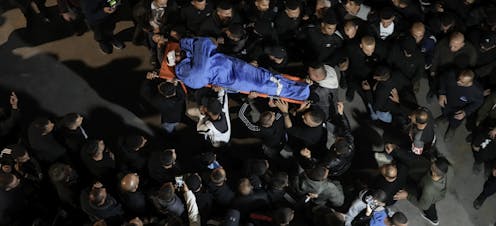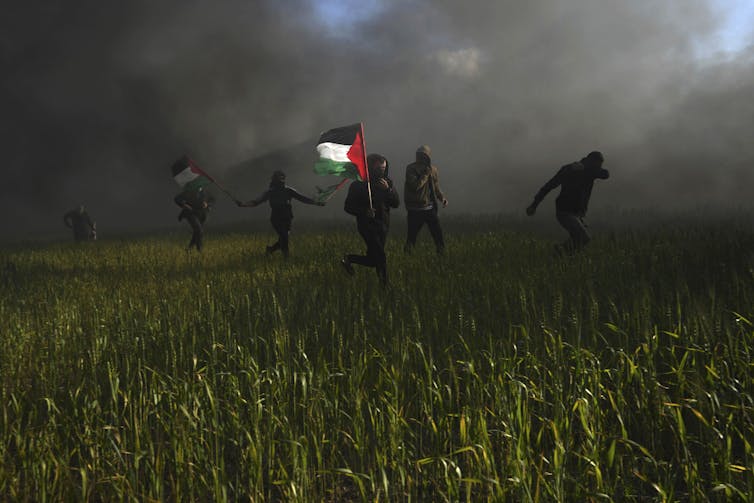
For the past two months, hundreds of thousands of Israeli citizens have been demonstrating against proposed judicial reforms by the country’s new far right-wing government that could seriously threaten their human rights.
The mass protests and general strikes have prompted the reforms to be delayed.

The situation in Israel has led some esteemed Canadian jurists, including former Supreme Court justices Beverley McLachlin and Rosalie Abella, to publicly express their concerns in a letter that the proposed Israeli changes will “weaken democratic governance, undermine the rule of law, jeopardize the independence of the judiciary (and) impair the protection of human rights.”
Their letter raises concerns about serious threats to the human rights of Israelis. It also inevitably raises questions about another grave Israeli human rights problem almost entirely ignored by that country’s legal institutions: the human rights of Palestinians.
Israeli apartheid
Over the past two years, several recognized international human rights organizations, including Amnesty International and Human Rights Watch, have released reports documenting massive and widespread Israeli violations of the human rights of Palestinians, both inside Israel and in the Occupied Palestinian Territories.
They have made headlines around the world because they have charged Israel with committing the crime of “apartheid.”
The term “apartheid” has been used before in relation to Israel by many thoughtful and respected international figures, including former U.S. president Jimmy Carter, Archbishop Desmond Tutu, former UN Secretary-General Ban Ki-moon, former Israeli attorney general Michael Ben-Yair and former Israeli Shin Bet director Ami Ayalon.
The Amnesty International and Human Rights Watch reports do not compare Israel to South Africa. Instead, they are judging Israeli practices in the light of the long accepted international definition of apartheid, enshrined in a UN treaty on apartheid dating back to 1973, as well as the 1998 Rome Statue establishing the International Criminal Court.
According to the Rome Statute, apartheid is:
“An institutionalized regime of systematic oppression and domination by one racial group over another racial group or groups and committed with the intention of maintaining that regime.”
Amnesty and Human Rights Watch’s conclusions align with the findings of several other respected human rights organizations, including B’Tselem and Al-Haq, as well as the UN special rapporteur on human rights in the Occupied Palestinian Territory — and one of the co-authors of this article.
Discrimination, repression
The reports are detailed, with hundreds of pages of evidence based on years of investigation, field reports and legal analysis. They document an embedded two-tier legal and political structure that gives one group — Israeli Jews — privileges in housing, employment and lifestyle while depriving Palestinians under occupation of the same access.
Accordingly, this constitutes “apartheid” — which international and Canadian law recognize to be a crime against humanity.
Resistance to this unequal system is answered by embedded repression, which includes incarceration without trial, torture, imprisonment of children and home demolitions. It also includes banning Palestinian human rights organizations on the grounds of “fighting terrorism.”
Palestinians resist Israeli apartheid at their own peril. At a recent news conference, Amnesty International Secretary General Agnès Callamard noted that since the Amnesty report was released a year ago, another 220 Palestinians have been killed by Israeli forces.
According to these human rights reports, “apartheid” is no mere derogatory epithet about some possible future state, but an evidenced-based accusation of current, grave breaches of international human rights law.
Predictably, the response of the Israeli government has been to accuse Amnesty International, Human Rights Watch and the other organizations of antisemitism while ignoring the specific accusations of human rights abuses in their detailed reports.
The response of the Canadian government has been to look away. It repeatedly rejects the accusation of apartheid without providing any reasons for that conclusion.

Difficult to refute
Perhaps it’s because the evidence and legal analysis are difficult to refute, uncomfortably so when it deals with a country Canada considers to be a close friend and ally.
But the case made by experienced and impartial organizations that Israel is responsible for the international crime of apartheid, cannot be ignored simply by saying “we disagree.”
Canada has been a reliably strong champion and supporter of the evidentiary research, legal analysis and conclusions of a range of UN human rights experts and bodies, and respected international human rights groups such as Amnesty International and Human Rights Watch.
Yet, on this occasion, Canada categorically disagrees with their comprehensive findings, and does so without any analysis or explanation of its own to back up and explain that rejection.
Read more: Canada missing in action on Israel's proposed annexation of the West Bank
These are substantive conclusions from highly respected human rights organizations that deserve to be treated seriously. Their findings have already been referred to the International Criminal Court. Ignoring them denies the reality before our eyes.
Canadians need to hear more, and in convincing detail. Why does Canada disagree that the Israeli government is responsible for the crime of apartheid?
The authors do not work for, consult, own shares in or receive funding from any company or organisation that would benefit from this article, and have disclosed no relevant affiliations beyond their academic appointment.
This article was originally published on The Conversation. Read the original article.







